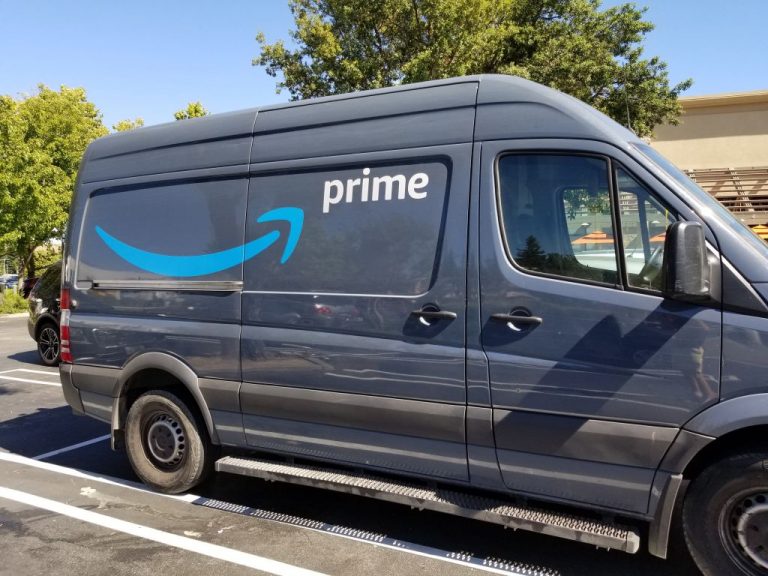Rumors are surfacing about online sales giant Amazon imposing a reign of terror on its small-time delivery entrepreneurs, subjecting them to unannounced closures, moves, and incursions, thereby pushing them into debt.
In a March 7 article in Motherboard, author Lauren Kaori Gurley brings up the story of a Boston-based delivery contractor who spoke under the alias “Jim,” who saw his job canceled on two weeks’ notice.
Amazon’s move forced Jim to sack his 86 staffers, all of whom were self-supporting entrepreneurs, many of whom lived on a minimum income trying to support a family.
“There were no rumors, no business coach saying, ‘Hey, you need to plan for this.’ Nothing,” he told Motherboard. “This would be like someone walking into your business and shutting it down and saying we don’t care. You can sue us. I am a pimple on the butt of an elephant when it comes to Amazon.”
Jim spoke on the condition of anonymity, fearing retribution from potential future customers as he wished to stay in the delivery business.
READ MORE:
- Amazon Under Fire for Selling Nazi Propaganda
- Woman Moved to Tears By Amazon Driver’s Heartfelt Reaction to Surprise Appreciation Gift
- Report: How Amazon Cozied Up To Beijing And Spread Propaganda To Grow Its China Business
- Monopolistic Posturing: Amazon Forcefully Acquiring Stakes in Vendor Companies
Success
You are now signed up for our newsletter
Success
Check your email to complete sign up
“It was horrible, absolutely devastating,” Jim recalled the way he was ditched by Amazon. “They didn’t explain anything. They just strong-armed me. I’m humiliated and embarrassed. We were working seven days a week. We never took any salary or pay. We left it in the business.”
A promising start
For Jim, the prospect appeared promising when Amazon launched its Delivery Service Partner program, tagged with the slogan “Own Your Success.” The program sold itself as the perfect opportunity for “aspiring entrepreneurs” to hop on the Amazon gravy train and profit from the company’s decades of experience and know-how.
The program further stated that “successful’’ operations could acquire profits ranging from $75,000 to $300,000 yearly while netting $1 to $4.5 million in revenue were proclaimed to be within reach.
But reality turned out to be completely different from the sales material. Jim is now indebted to the tune of $90,0000 resulting from workers’ compensation claims, parking costs, workspace rent, housing, leasing costs, maintenance, and damage repair for his fleet of 47 vans.
The publication also spoke with three other Amazon delivery partners operating in Oregon, Georgia, and California, all of whom were severely indebted and on the brink of bankruptcy.
Two former delivery partners from Portland sued the online sales giant in a $15 million lawsuit over the company’s regime, in which they allege Amazon practically “controlled nearly every aspect” of the two companies’ businesses.
The pair of enterprises had been forced to shut down, the suit alleges, as they “were losing money and employees trying to satisfy Amazon and their constant changes.”
The golden age of Amazon
Meanwhile, Amazon profited immensely from the Coronavirus Disease 2019 (COVID-19) lockdowns, scoring two all-time high stock prices in 2020 and 2021 while at the same time bagging a 220 percent profit increase in Q1 2021 year over year, amounting to $8.1 billion.
On top of that, Amazon conducts annual comprehensive audits on its delivery partners about everything from wage administration to damage insurance claims, and oftentimes without warning.
Meanwhile, Amazon reduced dependence on delivery giants such as UPS and the USPS while keeping a tight grip on its smaller delivery contractors. In this way, Amazon has managed to speed up delivery to its Prime customers even faster while shifting the burden of liability casualties, injuries, van repair, and maintenance on its contractors.
All four contractors interviewed by Motherboard complained about Amazon’s overreach and unfettered power to control every aspect of their operations, from payroll to route assignments to damage assessments.
Also, they said Amazon’s habit of changing regulations on a whim while always shifting the blame to delivery partners made it impossible for them to make a decent living.
“Getting this contract ripped out completely bankrupted me,” one owner said. “I had nothing to my name after I moved back. If I have to file for bankruptcy, they can come after my credit, my vehicles. I couldn’t get a loan on a car or buy a house.”
















